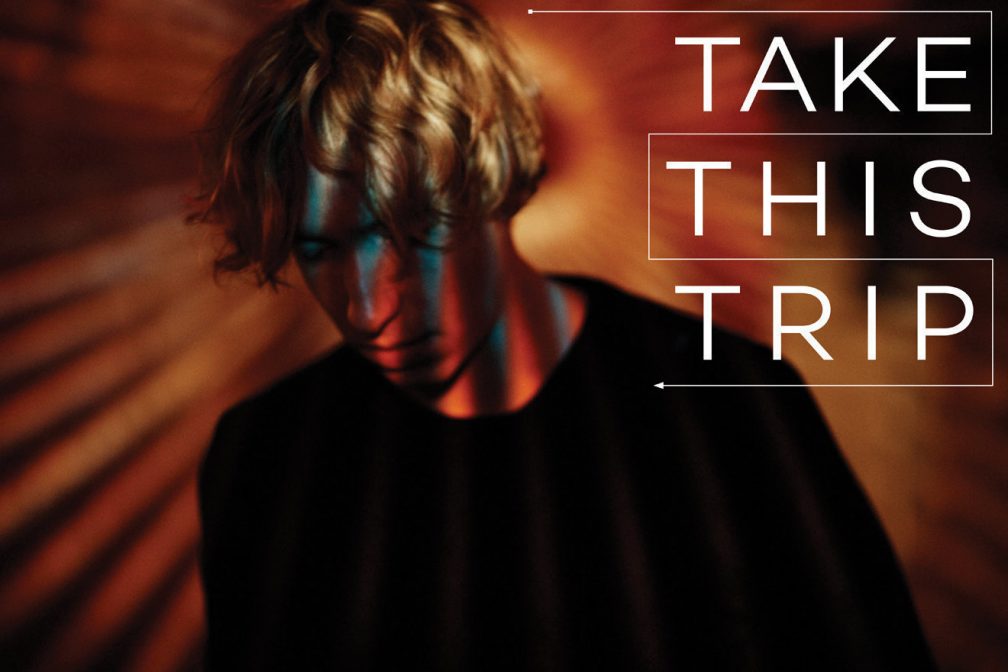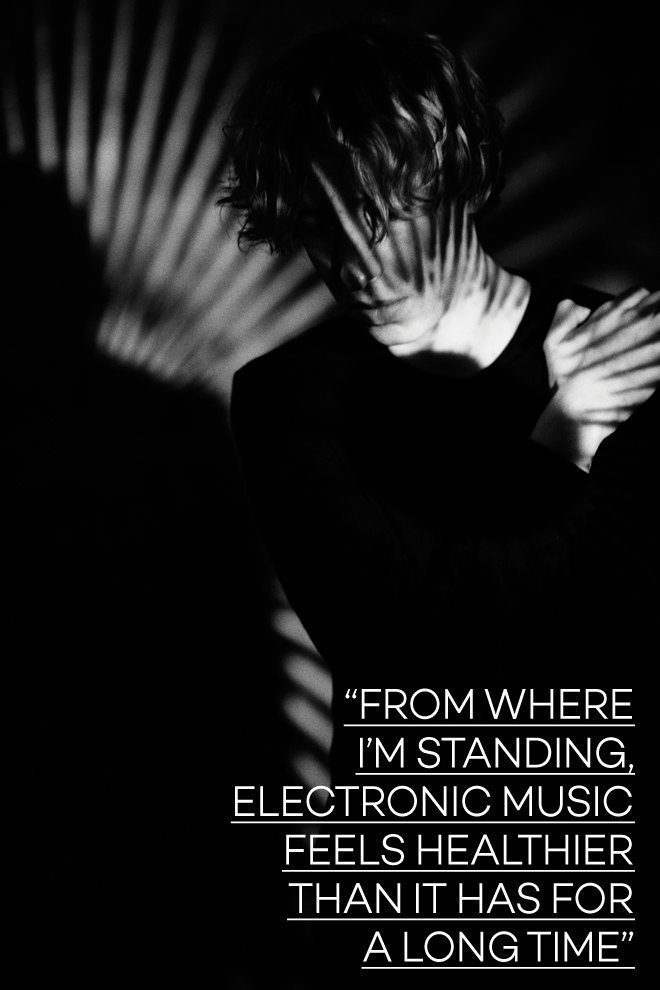 Features
Features
Daniel Avery
As his incredible breakthrough album gets the remix treatment from the likes of Rødhåd and Roman Flügel, we hit the road with Daniel Avery, an artist and DJ who delights in being different
When Daniel Avery first started DJing in the early 00s in his home town of Bournemouth, he regularly cleared the floor. On purpose. His sets featured a lot of on-trend (for the time) post- punk. If that didn't work he'd reach for 'March Of The Pigs' by Nine Inch Nails, or something from thrash metal band Slayer's 1986 album 'Reign In Blood'.
"I don't believe in dictating what music people should like, but sometimes a dancefloor needs cleansing," he says with a shrug, as though he can't see why more people don't do it. Actually, that does sound a bit like dictating what music people should like. "Maybe, but what you have to understand is that Bournemouth is one of the top hen and stag destinations in the UK," he continues. "The clubs are full of people asking the DJ to play funky house. They don't care about music." Even so, it was a bold move for someone attempting to make their way in the world of nightclubs, which are generally best when full of people. Avery nods: "I was a precocious little fucker."
In 2015, Avery is more used to filling dancefloors than emptying them in order to make a point. "Yeah, those days are behind me," he smiles. Yet he remains something of an outsider. His 2013 debut album, 'Drone Logic' – one of the outstanding electronic releases of the last two years, –was brilliantly out of step with the rest of dance music. It reminded us that being 'weird' and 'odd' (the two words that cropped up most often in reviews) can be a very good thing. See the title track, a pulsing techno groove overlaid with white noise drones that, at times, were almost painfully loud. "I was listening to a lot of My Bloody Valentine while making the album," Avery explains. Indie darlings MBV famously have a deafening interlude of noise at their gigs which they call 'the holocaust'. "Precisely," he says. "I like intensity in music."
It says a lot about the impact 'Drone Logic' made that all 12 tracks ended up being remixed. The full set of remixes are collected on the double album 'New Energy', which hangs together as a proper remix album – though it was never planned that way. It ranges from Roman Flügel's stunning, 10-minute cosmic electro house overhaul of 'All I Need', to Berlin rising star Rødhåd's thudding, cavernous version of the track 'Drone Logic' and Powell's take on 'Water Jump' – which doesn't so much rework the track as batter it into submission with jabbing bass. "The remixes are all very different, but you can draw a line between them all," says Avery. "They're all a bit out-there. They're all a trip to listen to. I hope that applies to me as well."
Tonight, Avery is playing in York. The previous evening was the third installment of his quarterly Divided Love night at Fabric in London. He didn't get in 'til 8am, and has yet to recover fully. He boards the train north with a carrier bag containing three cans of pre-mixed whisky and Coke. He grew up on indie and rock and he still has a bit of the indie kid look about him: tousled hair, black jumper, black jeans. He's smart and confident; despite being hungover, there are no "ums" or "errs" in his conversation.
Turns out, rather than regarding dancefloors from a position of snooty elitism, he thinks the bond between crowd and DJ is almost, well, sacred - which is why he cares about it enough to stop it being defiled. "DJing is a communal thing," he explains. "It's not the DJ playing music to a crowd. It's the night as a whole. The DJ feeds off the energy of the crowd. That's why it's so exciting. The best nights are where the crowd trusts you and you trust the crowd."
Trust is something Avery has issues with. "I never realised before doing all of this quite what a megalomaniac I am," he laughs. "I can't relinquish control of any part of it. I organised all the remixes on 'New Energy' myself. I have to have the final say on the Divided Love night. I have a big hand in the artwork. I co-direct my videos. Not because I want to be a tyrant; It's all part of one thing for me."

Sounds like he might have problems surrendering his music for someone else to change.
"I'm very particular about who I get to do remixes, so I trust them enough because I admire and respect what they do so much, so I'm fine with it," he says. "But I couldn't just give them to anyone. I've been asked to do remix competitions a few times, where anyone can have a go at remixing one of your tracks, but I just couldn't do that."
Likewise, he's picky about where he DJs. He turns down lots of gigs because he doesn't think the line-up makes sense. Curveballs are OK, but anything "incongruous" is not. "It's not because I don't want to be seen with these guys," he says. "It's just that I think the night as a whole is really important." No shared bills with Martin Garrix planned, then? "No."
Avery would rather play a one-off party in a grimy space in Athens than a shiny club in Ibiza. "The Greeks have a live-for-today kind of outlook," he says. "There's ridiculous unemployment, riots all the time. Violent anarchist groups who cause trouble. You see burning cars."
The last time he was in Athens it was the anniversary of the police shooting of a 16-year-old boy. People were kicking up trouble again and there were scattered riots. "The promoter said the police had shut some of the streets and subway lines leading to the club," explains Avery. "He was worried it might stop people coming. But they found other ways of getting there. It didn't make any difference. Everyone came. That's one of the great things about clubs. When you're lost in music on the dancefloor you can forget the rest of the world."
Avery keeps returning to this idea of losing yourself in the music. It's why he liked psychedelic bands growing up. It's the reason he likes the trippier end of dance music. "I like waves of noise. It's that feeling of being lost inside sound. Almost literally. Like when you're in a club and you feel like you can't move. I've never wanted to make anything 'pleasant' or easy listening," he says.
The psychedelic connection is something he shares with his Phantasy label boss, Erol Alkan. Avery was a regular at Alkan's Trash night in the 00s. He says Alkan was the first DJ he followed. "His career, I mean – not in a stalky way," he clarifies. How did he feel when Alkan, one of his heroes, began mentoring him? "Erol doesn't do anything by halves," says Avery. "That's the biggest compliment I can pay to anyone. He cares so much about every aspect of a release, of a DJ set. I've never seen any other DJ, when they arrive at a club, ask, 'Can I speak to the lighting guy? Can I speak to the sound man?' He tries to ensure everything is 100 per cent perfect." Avery has got a bit of that, too.
Mansion Underground in York is a little gem of a club, a bare brick cellar with room for a couple of hundred people, a couple of lights and a banging sound system. It's full for Avery's set. He fades out the resident's last record, then twisted and distorted voices from the track 'Drone Logic' start to swirl about the basement over the opening the reverb-drenched clangs and booms of 'Driftwork' by Rich Oddie. It's trippy: the kind of deep, minimal techno that sucks you in until everything else slips away.
"I like waves of noise. It's that feeling of being lost inside sound. Almost literally"
Tweet this quote
Avery is quick to point out that while he's now a headliner, at root he's the same DJ he was starting out. "Any success I've had has built slowly," he says. "It's definitely not been an overnight thing. The gigs I'm headlining now are clubs that I played the bottom of the bill five years ago. My taste has gone down different avenues, but fundamentally I haven't changed anything I do in that time." No urge to please the crowd, then? "I understand why some people do it, but I couldn't live with myself if I ever thought I was crowd-pleasing. I want people to have a good night, but I have to like it too."
Avery says that he feels like he's "still living" 'Drone Logic', that it doesn't feel like it's something in the past. "One thing I'm very proud of is that 'Drone Logic' is still finding new people," he says. Work has started on the follow-up, but is at an early stage. He wants to put something out "at the club level" towards the end of the year. "I feel energised by many things right now," he says. "I'm so excited about DJing at the moment. I feel like I've got ten times more records than I'll have time to play. That's exciting, when you're overflowing with music. I go into the studio every Tuesday with a set of
new ideas. It feels like something is happening. From where I'm standing, electronic music feels healthier than it has for a long time. Experimental and ambient worlds are mixing with harder techno. I guess you could say Berghain is the centre of it." He's talking about artists like Rødhåd, Silent Server and Ø [Phase]. He gets the same feeling from his Divided Love night, which, without any sense of big-headedness, he says feels like a focal point for the new wave.
A lot of the producers he's talking about are the remixers that appear on 'New Energy'. Does that mean he's part of this new movement? "I do feel part of something," he says. "I've got a lot in common with them, but I still feel like an outsider, too. I just don't have the same background. It's not like I was collecting Dance Mania records when I was 13."
You get the sense that Avery is protective of his otherness; that he knows that it's what makes him interesting, and wants to hold on to it. When he says he's not prepared to compromise his vision, even if other people don't always get it, it's not a pose – there's really no other way he could be. He may not be that callow indie kid any more, but he's never lost his independence.
'New Energy: Collected Remixes' is out now
[Photo: Steve Gullick]



